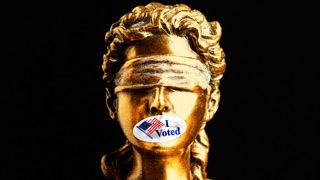
How has America slid into its current age of discord? Peter Turchin asks. Why has our trust in institutions collapsed, and why have our democratic norms unraveled?
Turchin’s research team analyzed societies across 10,000 years to study the drivers of societal collapse, and found two primary factors: When the economic fortunes of large swaths of society decline, and when the ranks of the wealthy and overeducated increase beyond the number of elite positions to accommodate them. The U.S. has confronted these twin forces twice before. The first instance led to the Civil War, which ameliorated elite overproduction only through the defeat of the South’s plantation-based aristocracy. The second led to the New Deal era, which, crucially, eased elite overproduction through nonviolent means. “The ruling class itself was an important part of this—or, at least, a prosocial faction of the ruling class, which persuaded enough of their peers to acquiesce to the era’s progressive reforms,” Turchin writes.
The U.S. faces similar challenges now. Wages have declined for much of its population, while the growth of its richest and most-educated population has outstripped the increase in elite positions, creating resentment and fomenting rancor. It leaves us on a precipice that once led to war, and once to reform. “The long history of human society compiled in our database suggests that America’s current economy is so lucrative for the ruling elites that achieving fundamental reform might require a violent revolution,” Turchin concludes at the link in our bio. “But we have reason for hope. It is not unprecedented for a ruling class—with adequate pressure from below—to allow for the nonviolent reversal of elite overproduction. But such an outcome requires elites to sacrifice their near-term self-interest for our long-term collective interests. At the moment, they don’t seem prepared to do that.”
https://www.theatlantic.com/ideas/archive/2023/06/us-societal-trends-in…